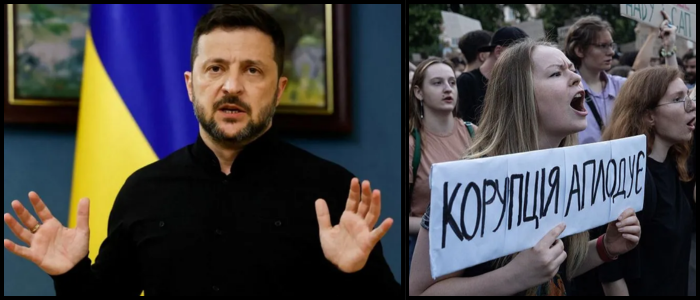Zelensky defended the move, arguing that the changes were necessary to eliminate "Russian influence" within the anti-corruption agencies. In a televised address, he criticised what he called inefficiencies, claiming that major criminal investigations had been stalled for years. He insisted the prosecutor general would now ensure that all offenders are punished appropriately.
Public and International Backlash
Following the bill's approval, hundreds of Ukrainians took to the streets in Kyiv, staging the largest anti-government demonstration since the Russian invasion began in February 2022. Protests also erupted in cities including Lviv, Dnipro, and Odesa. Demonstrators voiced their frustration, with signs declaring, "We chose Europe, not autocracy" and "My father did not die for this."
Under the new law, the prosecutor general, currently Zelensky ally Ruslan Kravchenko, will have the power to reassign or even close corruption cases—raising concerns about political interference. Critics argue this undermines more than a decade of progress following the 2014 Euromaidan uprising, which led to the removal of pro-Russian president Viktor Yanukovych and laid the foundation for Ukraine's pro-European path.
International allies of Ukraine, including the European Union, have voiced concern. European Commission spokesperson Guillaume Mercier said the EU was "concerned about Ukraine's recent actions" and reminded that financial support is linked to transparency and governance reforms. Marta Kos, European commissioner for enlargement, called the legislation a "serious step back," emphasising that Nabu and Sapo are vital to Ukraine's efforts to join the EU.
Strategic Impact and Tense Reactions
The day before the law passed, Ukraine's Security Service and prosecutor general's office launched operations against suspected Russian spies allegedly embedded in Nabu. The timing of this move has fueled accusations that the new law is more about political control than safeguarding the country from foreign interference.
Deputy Prime Minister Taras Kachka responded to criticism by stating that all "core functions" of the anti-corruption bodies would remain untouched, trying to assure international partners of continued commitment to reforms. However, former foreign minister Dmytro Kuleba openly disagreed, calling it a "bad day for Ukraine" and challenging Zelensky to choose between standing with the people or consolidating power.
Ambassadors from G7 nations have requested dialogue with Ukrainian officials to address the growing pressure on anti-corruption institutions. Despite the criticism, Ukraine's allies are unlikely to reduce aid or cooperation, given the ongoing war and the fragile state of its military situation.
While Zelensky insists the law is meant to strengthen, not weaken, the fight against corruption, many at home and abroad remain deeply sceptical of its real consequences.
World

Protests Rise in Ukraine Over Anti-Corruption Bill

Ukrainian President Volodymyr Zelensky has signed a new law that critics claim weakens the country's key anti-corruption institutions, triggering widespread protests and international concern. The legislation, which places the National Anti-Corruption Bureau (Nabu) and the Specialised Anti-Corruption Prosecutor's Office (Sapo) under the authority of the prosecutor general, has been described by opponents as a serious setback in Ukraine's democratic and anti-corruption efforts.















